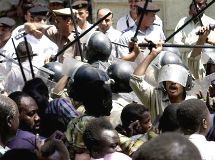Sudan refugees stage sit-in at UNHCR’s Cairo offices
Oct 12, 2005 (CAIRO) — A sit-in by hundreds of Sudanese refugees outside the offices of the UNHCR in the Egyptian capital entered its 14th day Wednesday, even as the agency insisted it could not meet their asylum demands.
 “We will remain here until the UNHCR meets our demands,” Amir Khalid, one of the leaders of the protest, told AFP.
“We will remain here until the UNHCR meets our demands,” Amir Khalid, one of the leaders of the protest, told AFP.
The protesters have presented the UN refugee agency with a list of over a dozen demands, including that it continue resettling refugees in third countries and reopen the cases of asylum-seekers whose files have been closed.
But the UNHCR insists it is unable to meet most of the protesters’ demands.
The protesters must understand that resettlement to a third country “is not the right of any refugee,” UNHCR senior regional external relations officer Leila Jane Nassif told AFP.
She added that this depended entirely on countries offering to accept the refugees.
Nassif also ruled out the possibility of reopening closed files in the near future. “I don’t see that happening,” she said.
The protesters, including women and children, have been camping in a park a few hundred metres from the UNCHR offices and have vowed to remain there until their demands are met.
Some have not returned to their Egyptian homes for several days, opting to sit under the blazing sun with little or no protection.
They claim harsh living conditions in Egypt have prompted them to ask to be resettled in third countries, fearing improving ties between Egypt and Sudan could result in forced deportation or repatriation.
Egyptian security forces have surrounded the protesters and prevented them going near the UNHCR offices.
There are 14,400 Sudanese refugees registered in Egypt, many of them from southern Sudan where a peace deal earlier this year ended decades of war, but also from western and eastern regions where fighting continues.
The north-south peace deal created a new political reality in the country and has paved the way for the return of hundreds of thousands of Sudanese refugees from neighboring countries.
“The situation is potentially changing,” Nassif pointed out. She noted that this has had an impact on decisions of countries to continue to resettle Sudanese refugees. “Many persons are starting to go back.”
The United States, Canada and Australia have resettled thousands of Sudanese refugees over the past few years, but the protesters accused the UN agency of freezing interviews for asylum-seekers.
Nassif stressed, however, that “nobody is forcing Sudanese refugees and asylum-seekers to return to Sudan.”
The protesters said that with assistance from the UNHCR limited to selected cases, they have had problems making ends meet, particularly given the difficulty of finding jobs in Egypt.
“We are assisting approximately 7,000 refugees and asylum-seekers a month. Unfortunately, there is never enough funding,” Nassif explained.
“If they cannot solve our problems, they should send us to another country,” said George Soroba, another protest organizer.
The protesters allege that the few refugees who find jobs end up being abused by their employers.
They also accused police of routinely harassing them, including arrest and detention for days.
“Police tell us that they do not recognise the UN (identity) cards,” Khalid said.
The UN responded that it was already doing its best to protect the refugees.
“Our concern is towards protecting these refugees,” Nassif said.
The protesters issued a statement arguing that the UNHCR was giving preference to Sudanese from the east and Darfur and ignoring applications for asylum from southerners.
“We reject the treatment of applications on ethnic basis,” it said.
An estimated 180,000 to 300,000 people have died in Darfur, with some 2.6 million civilians left homeless since fighting erupted in February 2003.
The war pits government forces and their Arab militia allies against ethnic minority rebels demanding greater political and economic autonomy from Khartoum. The situation has deteriorated in recent weeks.
Humanitarian conditions in the park are getting worse, according to Soroba. He said there was no clean drinking water or sanitation facilities and that there was concern about the outbreak of diseases.
(AFP/ST)
